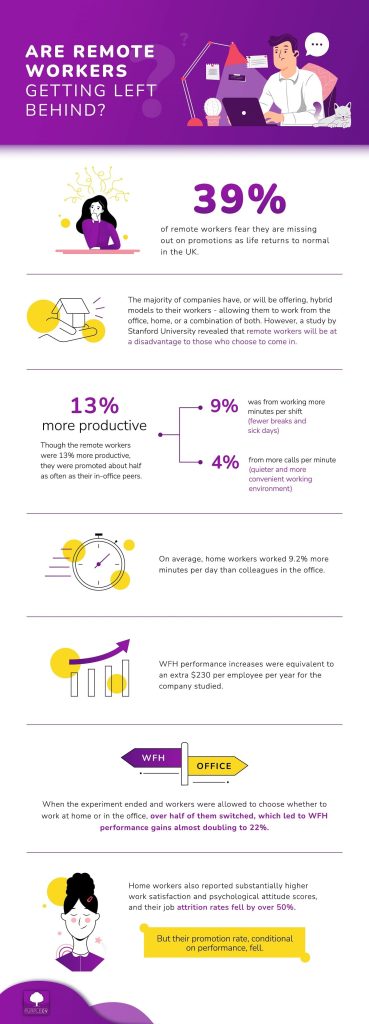Hybrid work model: a flexible system allowing employees to work from home; the office, or a combination of both if preferred. Many UK businesses have already introduced these models, reinventing the office space and attempting to bridge the physical gap with technology like video conferencing. Although Zoom and Skype are relatively efficient modes of communication between in-office and WFH colleagues, a study by Stanford University revealed that remote employees were promoted about half as often as in-office workers; that is despite being 13% more productive overall. For those who have to work remotely due to factors like: lack of childcare, looking after ill family members, or having developed mental health concerns over the course of the pandemic, this can feel incredibly frustrating as they don’t have the flexible option of going into the office.
PurpleCV.co.uk, a leading UK CV writing service, conducted a survey of 3,000 employees across the UK and discovered that almost half of (47%) Cheshire employees who are working from home indefinitely, are worried they are missing out on in-office advantages, such as receiving promotions. This was compared to a national average of 39%.
Moreover, those operating remotely often have to endure atypical working conditions (such as loud background noise; unstable WiFi connection and lack of on-site tech support), which can further exacerbate feelings of frustration when it comes to their job performance. And it doesn’t help that many feel like their efforts may remain unrewarded in terms of visibility and leadership positions.

Could bias against remote workers create a new workplace obstacle to overcome in the near future? While some might be enthusiastic to return to the office after months of remote working, others may be struggling with being in public spaces nowadays, with the risk of the virus still present. Those who are parents might have trouble finding reliable childcare post-pandemic, therefore, school runs need to be covered during the workday too, as well as supervision of younger kids.
Purple CV has put together advice for managers and employers on how to address feelings of remote working bias, to ensure WFH employees feel as included and supported as their in-office colleagues:
Check in regularly with your WFH employees
As mentioned above, there can be many obstacles associated with working remotely and for some employees, these circumstances cannot be easily alleviated. Make it a consistent habit to check in on the wellbeing of your employees who are working from home, especially if they have taken on the role of a carer during the pandemic. Some may assume that remote working is easier on employees’ mental health, simply because they have the opportunity to work from home. However, oftentimes this can have the opposite effect as there is little detachment between work life and personal life, resulting in an overlap of the two. If you want to contact your entire employee contact list quickly and easily, you can look for a bulk text message service which will enable you to send high volume texts immediately. You’ll be able to fire off hundreds of texts in minutes, and you can also automate bulk sends in order to save time. A bulk text message service is a great option if you want to send critical updates at lightning fast speed while building a stronger relationship with your employees.
Conference calls where everyone dials in from their laptop
Even if they’re based in the office! Instead of creating a silent divide between employees dialling in from their home offices and those in the office, suggest that all meetings take place virtually for everyone involved, even if they’re physically in the office.
Create an informal work group chat
If you miss chatting with colleagues, ask if they’d be comfortable with joining an instant messaging group chat, where you can communicate during mutually convenient and agreed-upon hours. Here, you can share memes, funny videos and engage in casual conversation that may help mimic these in-person co-working relationships. After it’s safe to do so, you might all even feel comfortable enough to go out together for post-pandemic drinks!
Chat to other WFH colleagues
Voice your thoughts and share them with other co-workers who are perhaps in a similar situation. You might discover that there are potential solutions to the concerns you’re having – ones you might be able to bring up with your employer too!
‘Though it may appear inclusive for companies to introduce hybrid workplace models, it should be taken into account the various ways in which the pandemic has affected employees – as well as their families – both mentally and in their daily lives,’ says Andrew Arkley, owner of PurpleCV.co.uk. ‘Ideally, workplaces should be diverse and inclusive across all fields, therefore bias should not exist between employees.’




